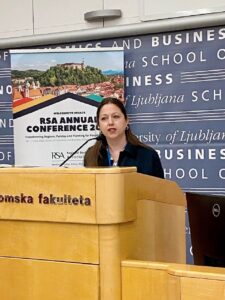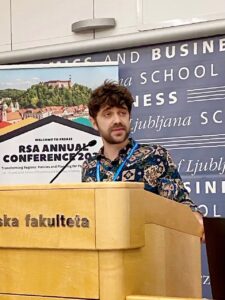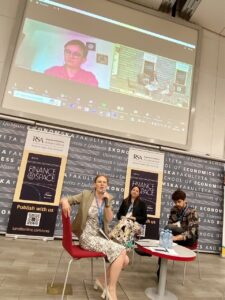The RSA Research Network on Financial Geographies has operated with RSA support under the auspices of the Global Network on Financial Geography (FinGeo). Since its launch in 2015, FinGeo has grown into a major global player with more than 600 members in over 50 countries spanning all continents. The Network has brought together geographers, economists, sociologists, political scientists, scholars in urban and regional studies, business studies, international relations and finance, and others. While our members mostly work in universities and research institutes, there are also FinGeo members working in government organisations, international organisations, NGOs, non-academic research firms and private sectors. The growing membership reflects an interest in our mission as being an open interdisciplinary network of academics, practitioners and experts interested in research on the spatiality of money and finance, and its implications for the economy, society and environment.
The RSA Research Network on Financial Geographies (FinGeo) aims to develop its global network of researchers to the next level as it fosters cutting-edge research on financial geographies, which are critical to regional studies. Building on the strengths of our previous successful RSA Research Networks (Geographies of Finance and Post-Socialist Transformations Research Network, 2010-2013; Research Network on Financial Geographies 2015-2018), FinGeo aims to continue expanding our Network membership globally beyond Europe, focus more attention on providing training and support for Early Career Researchers (ECRs) and strengthen engagement with non-academic participants (e.g. industry practitioners, NGOs, policy makers). These will foster global comparisons of the complex relationships among finance and regions, and enrich contemporary debates by facilitating exchanges of views of researchers and practitioners from different backgrounds, career stages and academic traditions. Such a truly global Research Network will enrich regional studies and contribute to policy debates through high-quality research outputs and engagement with stakeholders.
In recent years, FinGeo has held seminars and workshops in different parts of the world, including Frankfurt, Boston, Singapore, Sao Paulo, and Brisbane. In June 2018, FinGeo held its first Spring School in Brussels to train and support ECRs. In September 2019, the 1st FinGeo Global Conference was held in Beijing with over 120 international participants and more than 90 presentations.
With an extension of the funding, the Research Network will work towards the following key areas: growing membership, grooming ECRs, developing links with non-academic members, and dissemination of research and outputs. FinGeo will continue a strategy of promoting a broad, diverse, interdisciplinary and inclusive approach to financial geography. Nevertheless, two large research areas in which we plan to be particularly visible and make an impact concern sustainable finance and financial technology in cities and regions.
FinGeo website: http://www.fingeo.net/
Facebook: https://www.facebook.com/fingeonet/
Twitter: https://twitter.com/fingeonet
Past events
RSA Annual Conference Fingeo Plenary: Financial Centre Networks: From Florence to Sustainable Finance
13th June 2024, Florence, Italy
Speakers: Youssef Cassis, Robert Schuman Centre for Advanced Studies / European University Institute
Silvia Grandi, University of Bologna, Italy
2nd- 3rd March 2024, Beijing Normal University, China
Special Session at RSA Annual Conference, June 2023
This RSA FinGeo Research Network plenary session formed part of the launch of the new journal ‘Finance & Space’ (a collaboration between RSA and FinGeo). The plenary addressed the conference theme on ‘Transforming Regions: Policies and Planning for People and Places’ by highlighting the potential and challenges of economic transformation and socio-economic and political impacts as we transition to a post-Covid world and with net-zero targets dominating academic and public policy debates. The event was attended by approximately 150 people from more than 30 countries.
The FinGeo plenary session contributes to the network’s objective of promoting a broad, diverse, interdisciplinary and inclusive approach to financial geography. The title of the plenary ‘Sustainable Financing and Unsustainable Debt’ addressed one of three specific research areas highlighted by the network in the current period of funding, namely ‘sustainable finance and climate change’.
The plenary session, featuring three distinguished experts in conversation and employing examples from around the world:
- Katherine Brickell (King’s College London, UK) and Vincent Guermond (Royal Holloway London, UK) – Microfinance, over-indebtedness and climate adaptation: New evidence from rural Cambodia.
- Daniela Gabor (UWE Bristol, UK) – The green derisking state.
- Chaired by Sabine Dörry (Luxembourg Institute of Socio-Economic Research, Luxembourg)
The plenary addressed the following questions:
- How can we ‘shrink’ finance and turn too much (bad) debt turn into finance for social good?
- How can we tackle household over-indebtedness together with the climate crisis and the negative impacts these are both having on people’s and places’ health and well-being?
- How can we redesign and redefine (financial) relationships between places that (re)produce inequalities in resources, power and wealth?
The first set of speakers, Katherine Brickell and Vincent Guermond, presented research findings from recent projects in Cambodia and India that examines climate resilience, small scale credit and household outcomes. In their critique of developmental discourses around green microfinance and financial inclusion, they demonstrate the harmful strategies taken by households in Cambodia to ensure repayment of loans, ranging from further borrowing (and indebtedness) to selling assets and giving up on farming entirely. All of these point to increased economic precarity as agricultural livelihoods and indebtedness become more unstable in the context of climate change. The second speaker, Daniela Gabor, provided a macroeconomic perspective on how the state is shaping decarbonisation and green economic transition, by creating investible opportunities for private capital such as public-private partnerships in green projects and Green Industrial Plans to encourage developments in renewable energy and hydrogen markets. Drawing from examples from the USA and Europe, she point to a growing relationship between central banks, governments and private capital that focuses on incentivising investments away from ‘dirty’ sectors to ‘green’ sectors. However, she cautions against this outsourcing of green transition to private capital as this could lead to systemic greenwashing and there are distributional outcomes with the privatisation of public infrastructure. After the presentations, Sabine Dörry chaired the Q&A discussion, during which speakers and participants reflect on how these different modalities of addressing climate change challenges involve different scales and agencies of state actors and the uneven impacts of debt relating to gender and different Global South contexts.



FinGeo supported the 2023 RSA Annual Conference partners and supporters.
Click the link to view past seminars in the RSA FinGeo Virtual Seminar Series.
Plans for future events
- Conference on intersections of global production and financial networks, China, Nov 2023
- Spring/Summer School, Cape Town, mid 2024
- Workshop, London, Summer 2024
- Special Session at RSA Winter conference 2024 or 25
- Seminar, Italy, mid 2025